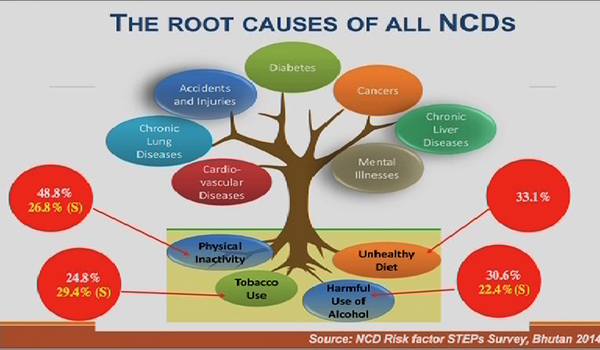 Despite having a multi-sectoral mechanism in place, challenges persist in prevention and control of non-communicable diseases (NCDs) in the country.
Despite having a multi-sectoral mechanism in place, challenges persist in prevention and control of non-communicable diseases (NCDs) in the country.
NCDs alone account for almost seventy per cent of deaths in Bhutan and places enormous burden on the country’s economy.
Key stakeholders and parliamentarians came together for a high level advocacy on NCDs yetserday. It was to map out ways to scale-up efforts to reduce deaths from NCDs by 2025 through a cross-sectoral approach and create a healthy and happy Bhutan by 2030.
The NCDs affecting Bhutanese include heart disease, diabetes, chronic respiratory diseases and cancers.
Most of the NCDs are preventable by modifying the risk factors. Alcohol, tobacco, unhealthy diet and physical inactivity are the main risk factors.
“When we talk about risk factor reduction, there has to be a multi-sector action and beyond health. Other ministries need to contribute,” Dr Palitha Mahipala with SEARO, WHO, said.
NCDs are not infectious and usually take a longer duration to progress. Effective control of NCDs requires relevant stakeholders acting on it.
“So, today’s forum was to bring together all the sectors, which is crucial for risk factor reduction.”
Dr Palitha Mahipala said the finance ministry, for instance, can be involved in alcohol and tobacco control reduction strategies. He said it can be done through an increased taxation.
Not engaging local governments, easy availability, access and affordability of alcoholic beverages, lack of strong implementation steps for discouraging unhealthy food products and lack of coordination among sectors are some of the challenges that need to be addressed.
“The primary mandates of the different sectors and the role they have to play are quite different. They feel that it’s the role of ministry of health to address that. But for health ministry, their mandates would be very useful for addressing the underlying risk factors for NCDs,” Dr. Karma Lhazeen, the Director of the Department of Public Health, said.
“So, as a result of that we developed a multi-sectoral action plan but we faced a lot of challenges in terms of collaboration and coordination among the sectors. The sectors lacked capacity and understanding to go forward with the NCD action plan and the roles that their ministries had to play in addressing NCDs,” Dr. Karma Lhazeen added.
With the engagement of parliamentarians and key stakeholders in combating NCDs, the advocacy meeting came up with recommendations to speed up the NCD response.
Strengthening the existing laws and regulatory measures on effective control of tobacco and alcohol, promotion of healthy diet and physical activity and control of risk factors are some of the recommendations.












